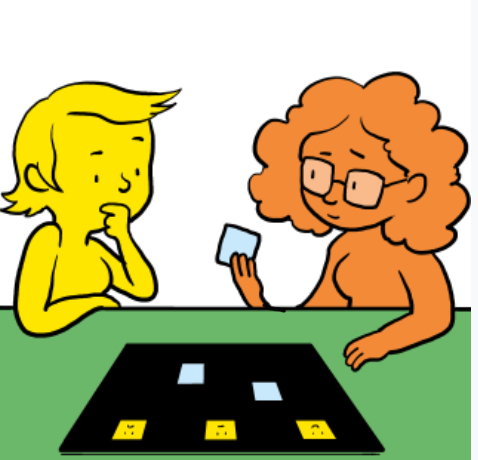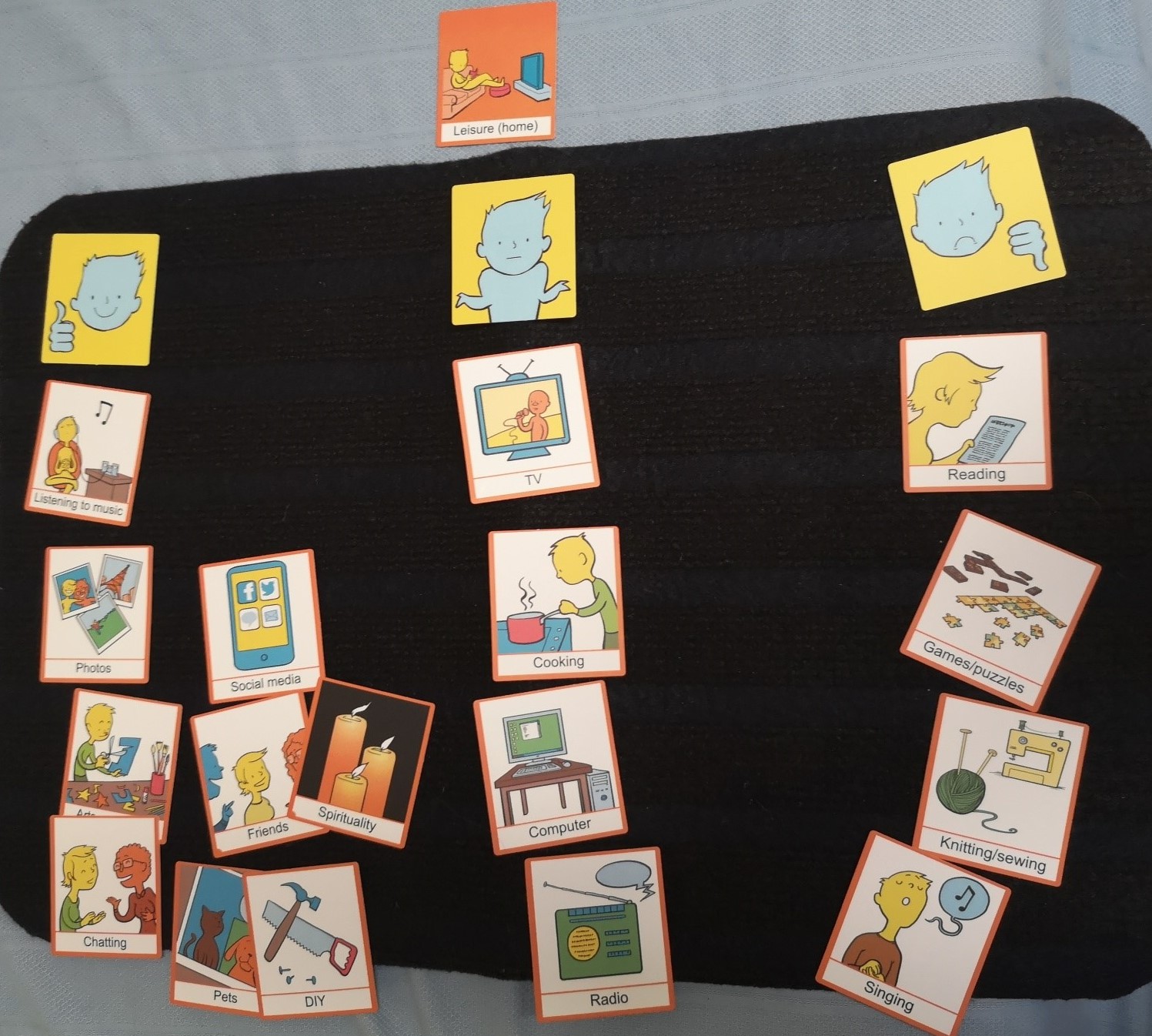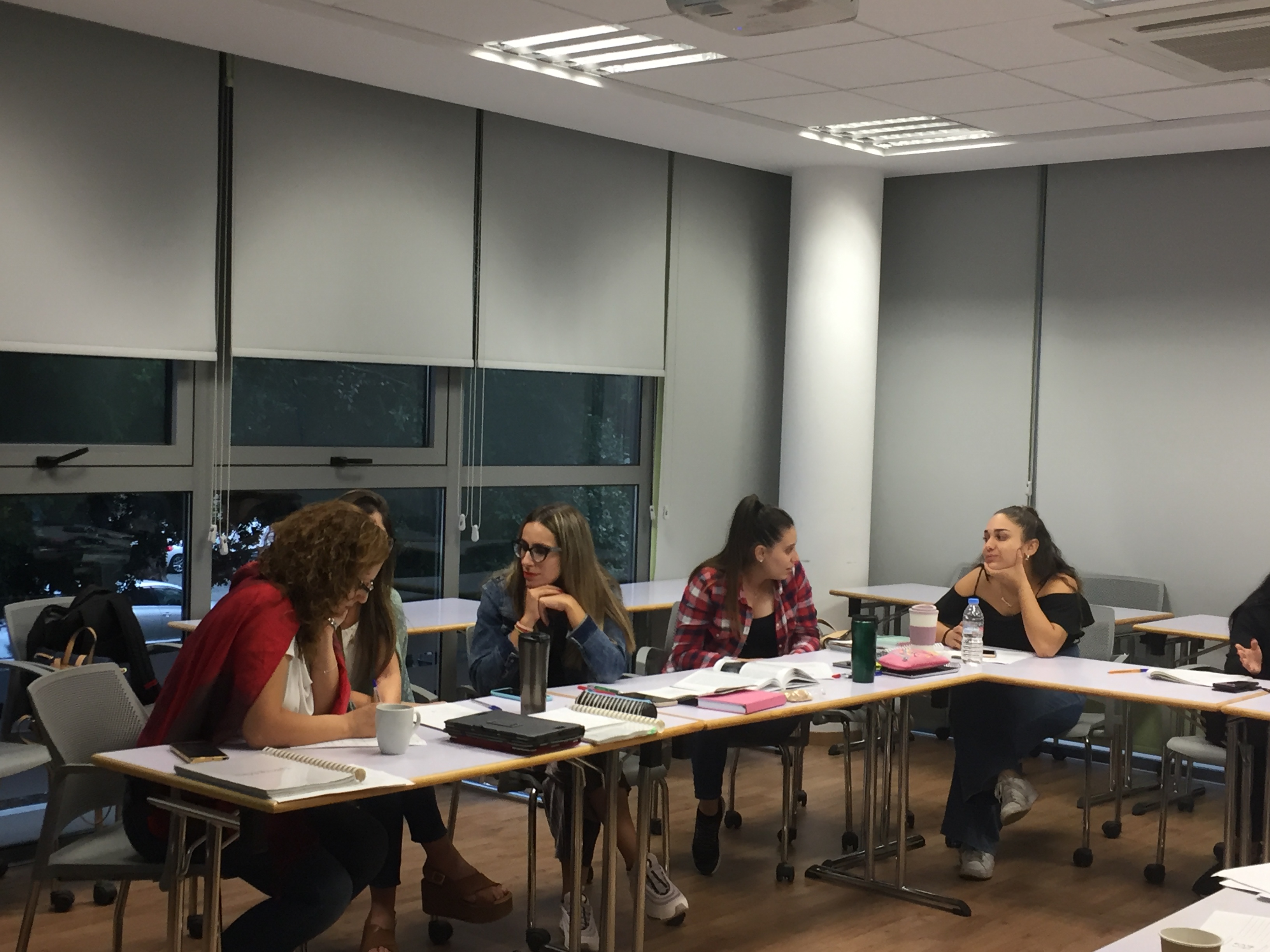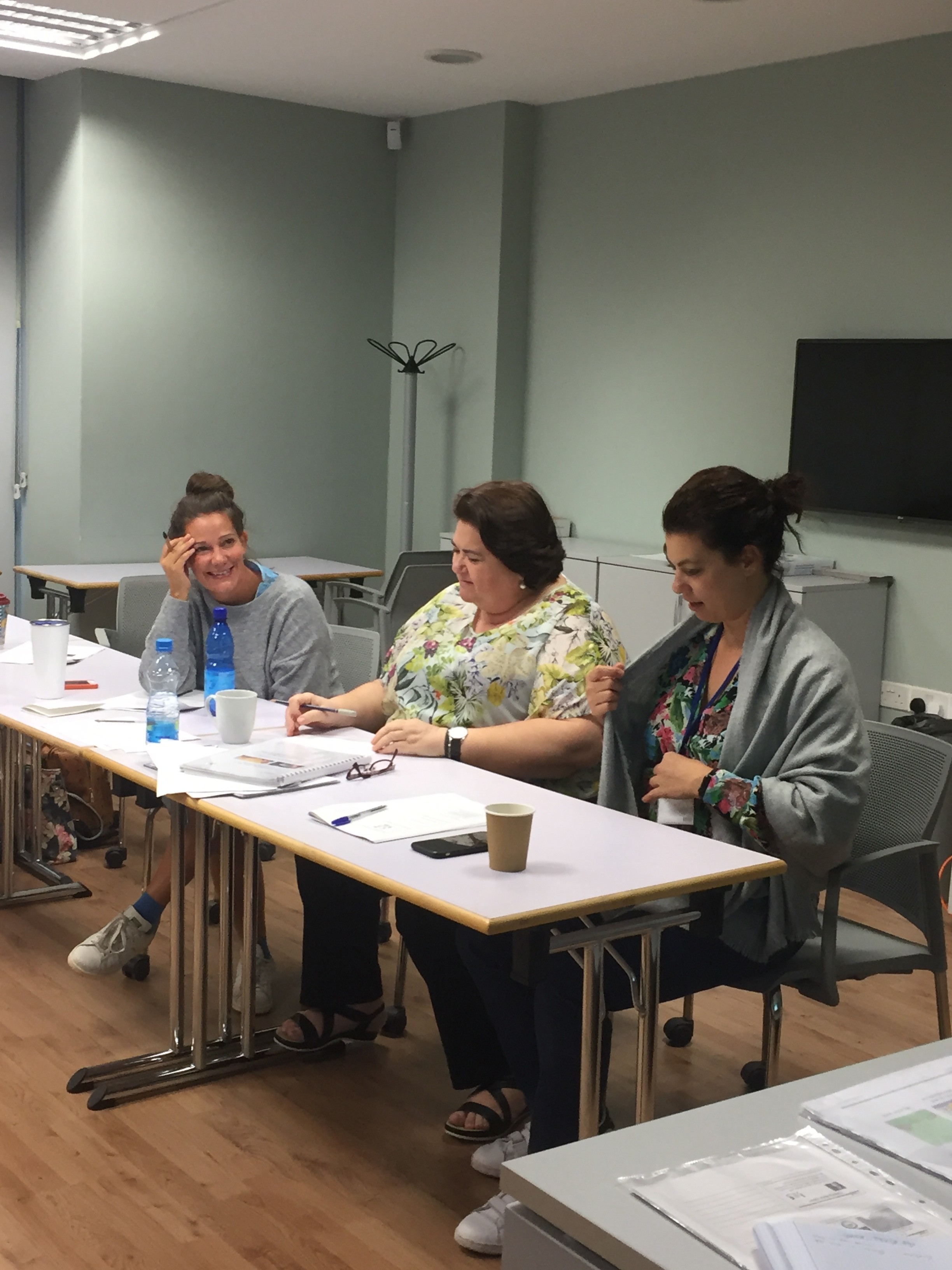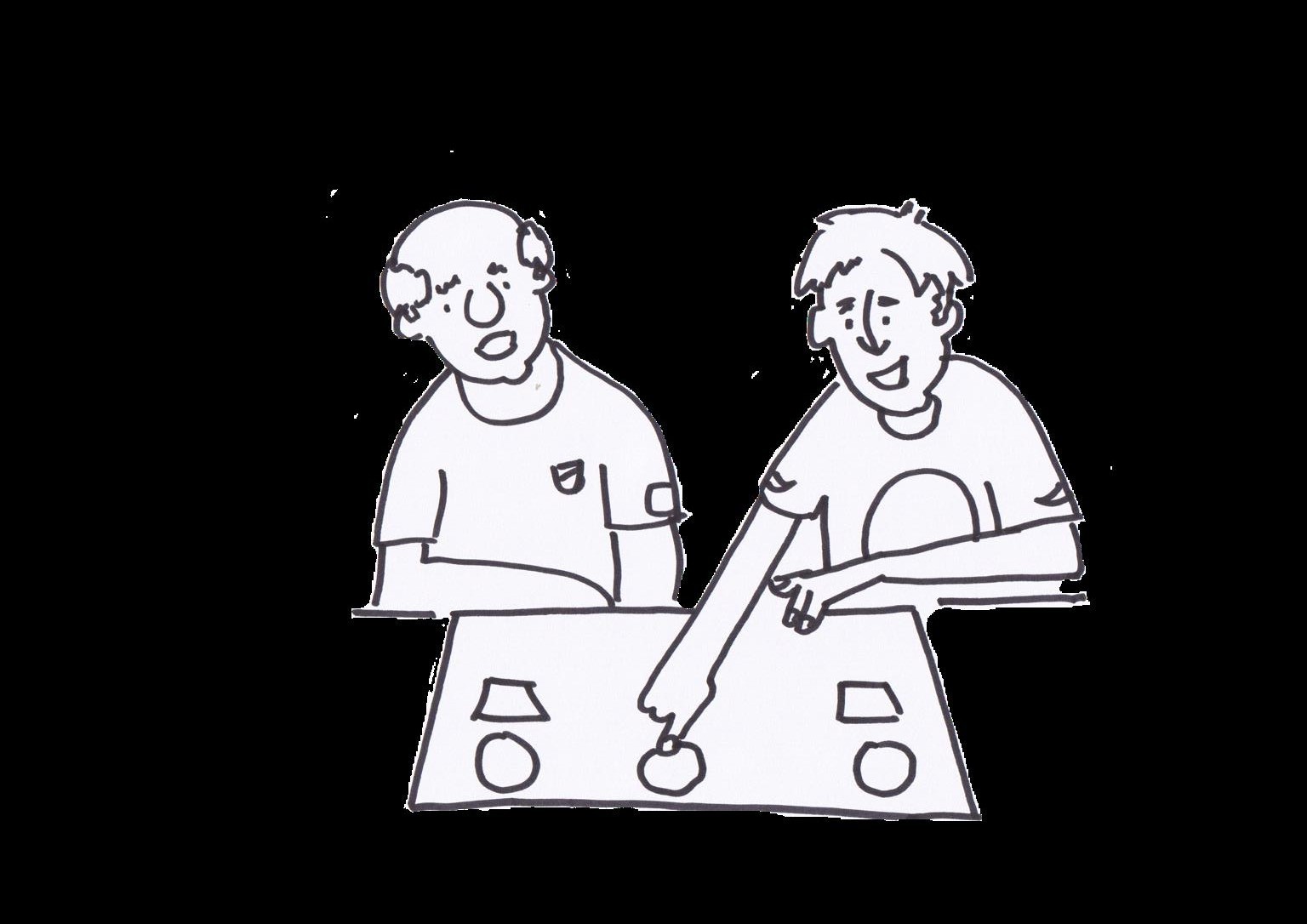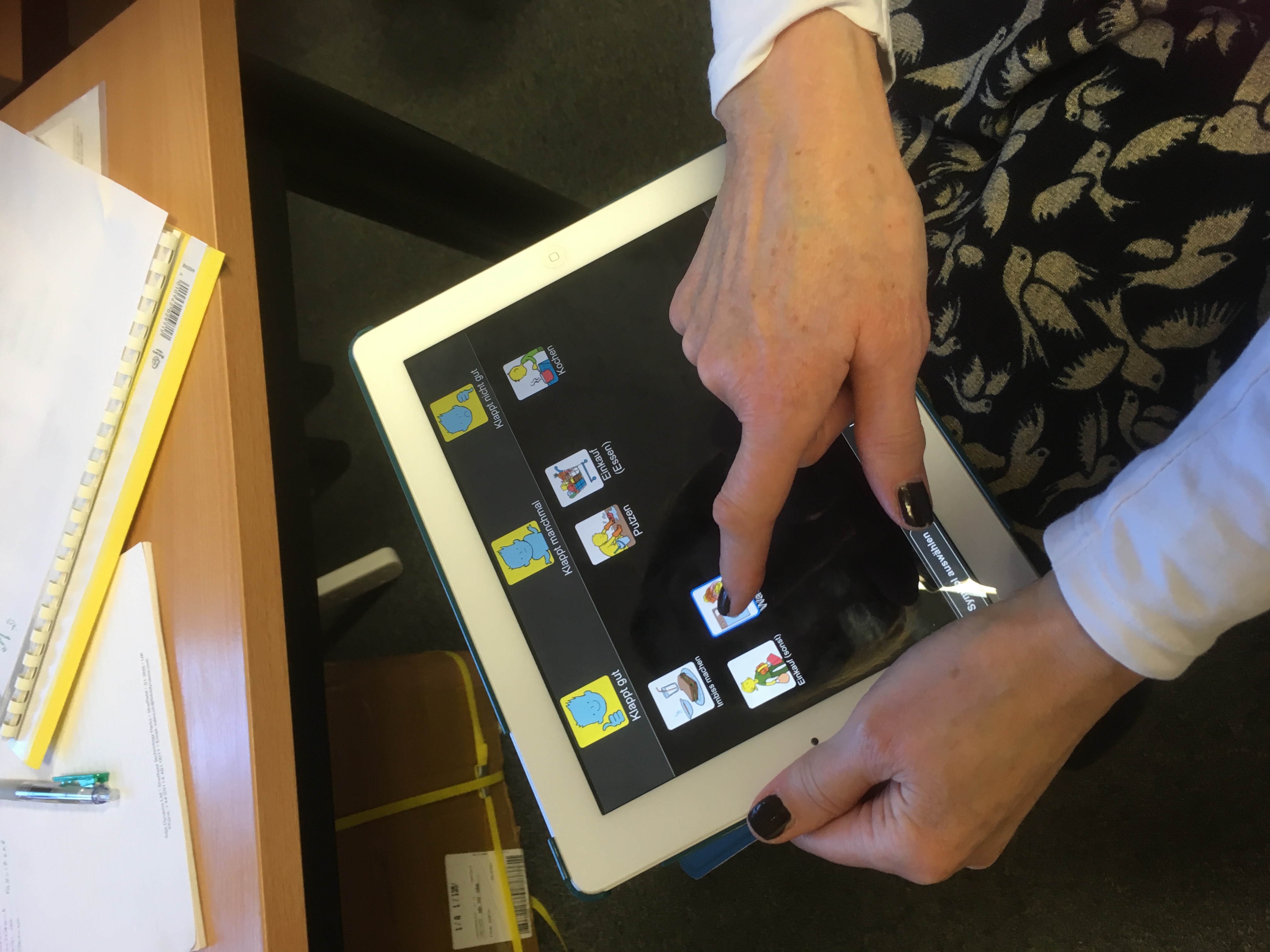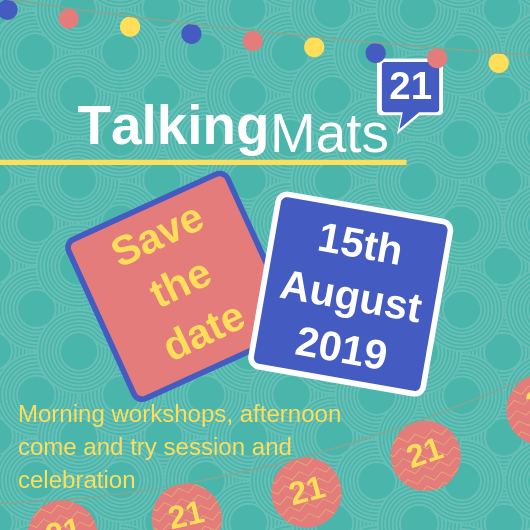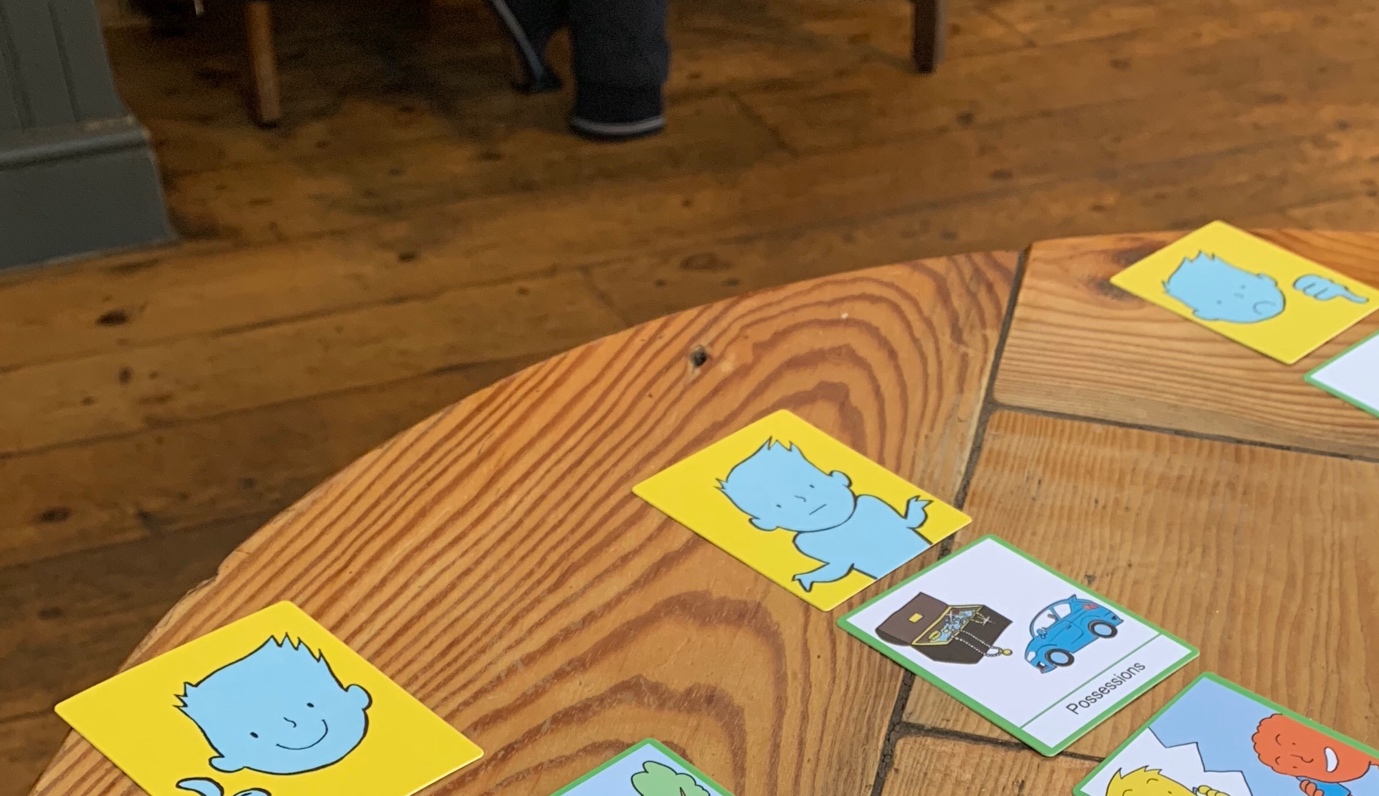Many thanks to our new Talking Mats Research Associate, Dr Jill Bradshaw (Tizard Centre, University of Kent), for this latest blog focusing on how Talking Mats can help people with communication difficulties to express themselves – to help work out the reasons for behaviour that challenges.
We know that around 10-15% of people with intellectual and developmental disabilities display behaviour that can be challenging. This might include hitting out at other people or injuring themselves. These behaviours can serve very important functions for the individual (e.g. to avoid something unpleasant or to get a need met). When we try to help make things better, we often focus on improving communication, quality of life and health and wellbeing more broadly.
How do we work out why behaviours that are challenging occur?
We often spend time observing the person and talk to carers and staff who work with the person to gain information about what is working well and what might help. This is part of a functional analysis. Here, the aim is to identify the factors that have led to and are maintaining the behaviours displayed. Traditionally, we have not really asked people directly what they think. This is partly people who display behaviour that challenges almost always have complex communication challenges.
How can we better access views of children and adults and would Talking Mats be one way of gaining views?
Together with Nick Gore, we have been working on ways of using Talking Mats to enable children and adults to give their views. We developed a series of mats focusing on:
- Likes and dislikes;
- Difficult behaviours;
- Things that help;
- Things that don’t help;
- General preventative variables.
What happened when we used the Talking Mats?
People were able to use these Talking Mats to tell us about what was important to and important for them. Some information was similar to reports from carers and staff and some information was in addition. For example:
- we gained information about preferred activities, such as riding bikes and preferred snacks. Doing things we like to do is important for all of us!;
- people gave us information about their difficult behaviours and where these took place;
- people were also able to give us at least some information about what made a bad day and what helped on a bad day. This information helped to inform support strategies.
You can read more about this work here: https://kar.kent.ac.uk/67033/1/PDF_Proof%20%283%29.pdf
Using Talking Mats certainly enabled some people to give their views. It was particularly helpful as a way of talking about difficulties, where a focus on the mat rather than on direct questioning was useful.
As expected, more people were able to access the more concrete topics we discussed and the more abstract topics were more difficult. We have also been working with the Challenging Behaviour Foundation to develop a range of methods (including Talking Mats) to help to gain the views of people with communication challenges. You can read more about this work here:
To view Jill’s presentation about this topic from our Talking Mats is 21 event last August, click here: TM and PBS final version for handout
If you are interested in Talking Mats and Research and have completed our Foundation Training Course, you can find out more about our new Talking Mats Research Network Group by emailing Jill at J.Bradshaw@kent.ac.uk, and watch this space for a new blog all about the group – coming soon!
Many thanks to Georgia Bowker-Brady, Advanced Specialist SLT (Berkshire Healthcare Foundation Trust) for this latest guest blog.
I attended the Talking Mats training in June and I work in both dementia care and acute mental health in-patient services.
I had initially imagined that I would primarily be using the Talking Mats to support the dementia patients.
However I’ve been surprised to find that I have been increasingly using Talking Mats with functional patients and it has been a really positive tool when discussing with patients about their self-care, the care they are receiving in the hospital and opinions on discharge.
Due to their mental state, many of the patients may find it hard to organise and express their thoughts, and if patients are hypomanic it can be difficult for professionals to guide the topic to get meaningful information, but Talking Mats has really helped with this! It has also been pertinent in establishing patients’ insight levels and gaining better understanding of their impression of the current situation.
Here is a photo of one my mats from the psychiatric adult acute wards. This was for a patient who is severely low in mood and has relatively recently gone through a traumatic incident. The ward staff and OTs have had difficulty gathering any information about what she ordinarily enjoys doing in order find some activities to try and engage her with.
The staff stated that the patient would simply report she doesn’t enjoy anything and questions about what she used to enjoy received no answer. I went and did a joint session with the OT where I asked about what she enjoyed doing before this incident and we did the mat (see picture below) in a matter of minutes.
This can now provide a starting point for considering areas for trying to encourage some behavioural activation.
We then extended it by using an emotions wheel to ask how she felt about certain activities available in the hospital. We were able to establish that she felt fearful about trying new things and sad about carrying out certain activities she used to do prior to the incident.
It is wonderful to hear such a great example of Talking Mats in action – if you have any stories you would like to share, please get in touch with us at info@talkingmats.com
The Talking Mats Board is delighted to appoint Dr Jill Bradshaw from the Tizard Centre, University of Kent, to the position of honorary research associate. This is our first appointment of this kind. Talking Mats is an evidence-based framework and research is important to us – but that research needs to be much more diverse, and involve a much wider range of people.
Jill’s role will be to give the Talking Mats team:
- A sounding board for research ideas and proposals
- Advice and support on publishing articles
- Identify research gaps and advise on funding avenues
We are also very aware that a number of people are using Talking Mats as a research tool, and Jill will also help to develop a virtual research network to bring interested researchers together. We are still exploring ways in which this could work, but it could involve an email network, virtual seminars and/or twitter chats. If you are interested in being included, and have completed our Talking Mats Foundation Training course, Jill would love to hear from you. Please email her on J.Bradshaw@kent.ac.uk – or email info@talkingmats.com and we will forward your interest to her.
Jill is really excited about this new post. She says ‘We know that the voices of people who have communication challenges can be excluded from research. This is a great opportunity to work with others to think about how we can use Talking Mats creatively in research and to find ways of including views from a wider range of people’.
Lois Cameron
November 2019
Many thanks to our Talking Mats Founder, Dr Joan Murphy, for this latest blog talking about the training course she recently delivered at the Cyprus University of Technology.
Cyprus is a beautiful Mediterranean island with a population of approximately 1 million.
I was invited by Dr Eliada Pampoulou to run a 2-day course on Talking Mats for 12 Speech and Language Therapists, some of whom are masters students and some, lecturing staff at the Cyprus University of Technology. The Cyprus University of Technology founded the first Department of Rehabilitation Sciences in Cyprus and the Department offers the first public recognised university bachelor degree in Speech Language Therapy / Speech Language Pathology in the Greek language (https://www.cut.ac.cy/faculties/hsc/reh/).
Day 1 was a Talking Mats foundation training course and Day 2 focused on discussion around capacity, research and clinical applications. This model worked very well as the participants were able to think about and discuss how to apply the training immediately.
Some of the immediate plans of the participants were both clinical and research oriented and are outlined below:
- To administer the Greek Stroke and Aphasia Quality of Life Scale (SAQOL-39) with healthy people over 50 both with the text version and an adapted Talking Mats version quality and to examine which they prefer.
- To use Talking Mats both with people with people with aphasia and their carers in order to share their understanding about the communication skills and needs of people with aphasia.
- To use Talking Mats as a tool to identify the factors that are related to AAC system acceptance or abandonment by focusing directly to the views of people with complex communication needs
- To use Talking Mats as a goal setting tool for both paediatric and adult population
- To use Talking Mats to gets clients feedback about therapy services
- To use Talking Mats for student appraisals regarding their clinical training
Dr Eliada Pampoulou has created the first Talking Mats centre in Cyprus which aims to gather all people who received training every few months to share their experiences and support each other to embed Talking Mats in practice and research.
We hope that Eliada will come to Stirling next year to gain her Talking Mats licence to enable her to train others and extend the reach of Talking Mats even further.
We regularly run our Licensed Trainer 2-day courses at our base in Stirling – if you have attended Talking Mats Foundation Training and would like to train other people find out more here:
https://www.talkingmats.com/training/train-the-trainers-accredited-training/
Many thanks to Susan Gowland, SLT at NHS Fife Forensic Learning Disability Service, for this guest blog summarising the fantastic presentation she delivered at our TM is 21 event in August 2019.
As a speech and language therapist within NHS Fife’s forensic learning disability service, I work across two low secure wards. In my presentation for the “Talking Mats is 21 event” I talked about the way in which Talking Mats is used within these wards and the positive impact this has had for staff and patients.
Regular Check In: “it’s the same questions, but it’s easier to talk with the pictures”
Some of the people I work with use Talking Mats as a regular check in tool. Conversations are often based around the Wellbeing, Relationships and Thoughts and Feelings cards of the Keeping Safe resource, with personalised adaptations agreed with the thinker. Some people who find it difficult to express how they are feeling and irritations can either build up to a serious incident or the person can get weighted down by unexpressed needs and concerns. For these people a regular check in can address the small things before they become big things. This can help the thinker feel listened and responded to, build experiences of communicating effectively, as well as trust and therapeutic relationships, all of which are assets which will support the person to move on.
Self Reporting: “It helps me understand how I’m feeling about things”
For some people, the check in can have a specific focus. In a hospital based forensic service, unexpected and unrecognised changes in mental health can lead to serious incidents. To address this we have used Talking Mats to talk about mental health. SLT have worked with individuals, psychiatry & nursing to identify personal symptoms of mental health changes. These symptoms become options in the Talking Mat & can be used to support person to self report at the times their mental health changes. Being able to do this enables people to discuss the support they need & reduce the risk of out of the blue incidents. The Talking Mat itself can be a support. As one thinker said, “Talking Mats relaxes you, it calms you down”.
As and when required:
The regular use of Talking Mats on the ward has led to other patients asking for Talking Mats sessions. As a licensed trainer I offer training to all professionals within our multi-disciplinary team and there is often at least one Talking Mats trained nurse on shift. This means ad hoc requests can be facilitated and some thinkers have started using Talking Mats in weekly meetings; as a tool to talk through emotional events and as a way of exploring the mixed emotions around discharge. In the words of one of the charge nurses:
“Talking Mats has enabled me to communicate with people in a way that is meaningful. To support someone to express and understand their thoughts and feelings regarding both joyous and distressing events is a privilege. The format may be simple, but the outcome is often comprehensive and insightful.”
(Picture drawn by Fiona Glanville, staff nurse, NHS Fife)
If you would like to find out more about accessing Talking Mats training, check out this link:
https://www.talkingmats.com/training/
If you are interested in our Keeping Safe resource mentioned here (available to those who have accessed our Foundation Training / Online Training Course) please see these links for more details:
https://www.talkingmats.com/keeping-safe-a-new-talking-mats-resource-available-to-purchase/
https://www.talkingmats.com/product/keeping-safe/
Talking Mats is now used in many countries all over the world. As part of our #TMis21 blog series, we wanted to share this great example of Talking Mats being used in Germany.
In March 2019 Prof. Dr. Norina Lauer (OTH Regensburg) and Elena Maxheimer held a lecture and a workshop about Talking Mats at the “aphasia days” in Wuerzburg, Germany. Many thanks to Norina and Elena for sharing information about the “aphasia days” for this blog post.
The “aphasia days” are a large congress – unique in Europe – for people with aphasia, family members and speech and language therapists (SLT). Every year around 600 people from Germany, Austria, Switzerland and Hungary are coming to this event. There are talks, workshops and podium discussions held by participants with aphasia, family members or SLTs. In front of approx. 150 listeners Norina and Elena gave a lecture about Talking Mats and the results of Elena’s bachelor thesis, in which she worked with people with aphasia, who learned to use Talking Mats.
In a three-hour workshop at the “aphasia-days” Norina and Elena taught nine people with moderate to severe aphasia how to use Talking Mats. All persons brought their own tablets and logged into their own account. They where shown how to choose a topic and a top scale and practiced in teams of two. All of them conducted several sessions with different topics and switched partners a couple of times. They had a lot of fun talking about things that matter to them and learn more about their peers. At the end of the workshop they were able to use Talking Mats themselves and are going to use it with their relatives and friends at home. As the workshop was very well received by the participants, it is likely to be repeated at the next “aphasia days” 2020.
If you would like to find out more information about Talking Mats in Germany, and the Digital Talking Mats app which is now available in German, check out https://www.talkingmats.com/talking-mats-in-germany/ and https://www.talkingmats.com/german-digital-talking-mats-with-people-with-aphasia/
Our Talking Mats is 21 Event is in Stirling on Thursday 15th August 2019. Thanks to funding from NHS Forth Valley endowment committee the event is free but you do need to book your space https://www.eventbrite.co.uk/e/talking-mats-is-21-tickets-62362171935
You can come to the morning only, afternoon only or come for the whole day.
If you can’t come to our event watch out for out blogs and social media celebrating the reach of Talking Mats for 21 days before the 15th of August. Please join in with your contributions using the hashtag #TMis21. For 21 days after our event we will be having a special Birthday offer! Watch this space, more to follow …….
Rachel Woolcomb, our Talking Mats OT Associate, shares a recent personal experience where she used Talking Mats to support a difficult conversation:
The vision of Talking Mats is to improve the lives of people with communications difficulties. I have been reflecting recently on the definition of ‘communication difficulties.’
When I first heard about, and started to use Talking Mats 10 years ago, my perception was that it was fantastic for those that could not speak but I must admit I didn’t really consider using it with people who, such as myself, could use their voice to communicate.
Over the years as my understanding has developed, and I have looked further into the use of Talking Mats as a ‘thinking tool’ I have come to a different conclusion.
I would like to suggest that at some points in our lives, each one of us is likely to experience a communication difficulty. I don’t mean that we cannot physically speak, but that we cannot express what we really want to say in words. Perhaps a topic is too difficult to talk about with someone so we don’t bother, or we are overwhelmed by the subject that we don’t really know where to start.
One such subject is that of death and dying.
We know it will happen to us all one day but to talk openly with loved ones, is for some reason, too much to comprehend, too emotive, or considered bleak.
I am very fortunate enough to have grandparents in their 90’s however the conversation about their wishes for the future goes unspoken. It is a challenge for my parents to raise the issue therefore it remains the big unknown.
This is a common problem. In 2009, The National Council for Palliative Care wanted to address this issue and set up the Dying Matters Coalition in England and Wales, to help people talk more openly about dying, death and bereavement and to make plans for the end of life.
Talking Mats have produced a set of topic cards called ‘Thinking Ahead.’ https://www.talkingmats.com/product/thinking-ahead/
These were created in consultation with Strathcarron hospice to help people with advanced illness or long term conditions to think ahead and plan for the future. The three topics in the set are: Affairs, Care and Treatment and Personal Values.
My Mum was interested in my role with Talking Mats and wanted to understand what it was all about. We had already started to talk about the challenges of having difficult conversations, especially about death, and therefore over a drink, in a relaxed coffee shop, we embarked on a journey of discovery using a Talking Mat. My Mum as the Thinker and myself as the Listener .
She used the Talking Mat to help her think about things she had not considered and was able to make plans about what she wanted to do next. I heard her wishes and her thoughts, on why certain things were important to her. It was a very special time, facilitated by a Talking Mat.
My challenge to you as readers of this blog is to ask yourself ‘what do I have difficulty talking about’ – A Talking Mat just might be the answer!
Another resource you might find helpful is ‘Let’s Talk about Death and Dying’ – www.ageuk.org.uk
Rachel will be running a ‘Talking Mats as a Thinking Tool’ workshop at our Talking Mats is 21 Event is in Stirling on Thursday 15th August 2019. Dr Sally Boa from Strathcarron Hospice will also be running a ‘Talking Mats in End of Life Care’ workshop at this event. Thanks to funding from NHS Forth Valley endowment committee the event is free but you do need to book your space https://www.eventbrite.co.uk/e/talking-mats-is-21-tickets-62362171935
You can come to the morning only, afternoon only or come for the whole day.
If you can’t come to our event watch out for out blogs and social media celebrating the reach of Talking Mats for 21 days before the 15th of August. Please join in with your contributions using the hashtag #TMis21. For 21 days after our event we will be having a special Birthday offer! Watch this space, more to follow …….
Last week, Laura Holmes, our NW England Associate, had the pleasure of interviewing our inspirational Founder, Joan Murphy. Joan will be retiring after our Talking Mats 21 event on 15th August 2019 and so this was a great opportunity to find out more about her Talking Mats experiences:
Are there any stand-out moments for you, from your Talking Mats time?
Talking Mats are now used in many countries across the world and it has been great to have the chance to travel widely. One particular moment which stands out for me was during one of two trips I made to China with Sally Boa. I was asked to demonstrate Talking Mats with a man who was in hospital having had a stroke. He had no speech and was using a wheelchair. I used Talking Mats to find out what the man felt he could/ couldn’t do. The man shared that he felt he could walk. I had to present the symbol three times as the family members and medical staff watching were adamant that the man could not walk. On the third time, the man pushed the table, moved his wheelchair back then stood up and walked around the room. His family and medical team were completely shocked and realised that no-one had actually thought to ask him if he could walk. This was a massive turning point both for the man – and also for his family and medical team, who could now see the power of using a Talking Mat.
Have you done any Talking Mats yourself that helped you to make an important decision for you or your family?
Absolutely – quite a few! My husband and I both used Talking Mats for our Power of Attorneys and shared them with our lawyer and grown-up children. My husband and I also used Talking Mats to talk about the Scottish Referendum as we had opposing views – it really helped as it made us listen to each other without interrupting. We then went on to use the mats as part of a presentation. Various members of my family have used mats to explore personal issues and decisions
What are the top tips you have gained from your Talking Mats journey – from working in the NHS and then more recently as a social enterprise?
You have to have humour. And be able to listen. It has been essential to be able to work in partnership with Lois and the other Talking Mats team members. The team are such nice people to work with and we have lots of laughs. Setting up as social enterprise was vital for Talking Mats – in terms of having the freedom to be creative. It felt as though someone had a big rubber band which was able to be released. It was a huge risk and there have been lots of leaps of faith along the way.
Do you have any top tips for people using Talking Mats in the Listener role?
Be quiet – and Listen! It’s also important to feel relaxed and to have a sense of humour whilst using it. A Talking Mat is not a test – it is serious, and can be used to explore difficult issues, but it should be fun.
Talking Mats is a low-tech AAC system – do you think it has a place in the modern world?
It is absolutely crucial! Low-tech resources are fundamental in terms of being able to have and develop conversation skills and social closeness.
What do you want for Talking Mats in the next 10 years?
World Domination! Talking Mats has the potential to be used everywhere in the world, by everyone. However I would like to see Talking Mats continue to have a small core team, but increasing Licensed Trainers across both the UK and the rest of the world.
Our Talking Mats is 21 Event is in Stirling on Thursday 15th August 2019. Thanks to funding from NHS Forth Valley endowment committee the event is free but you do need to book your space https://www.eventbrite.co.uk/e/talking-mats-is-21-tickets-62362171935
You can come to the morning only, afternoon only or come for the whole day.
If you can’t come to our event watch out for out blogs and social media celebrating the reach of Talking Mats for 21 days before the 15th of August. Please join in with your contributions using the hashtag #TMis21. For 21 days after our event we will be having a special Birthday offer! Watch this space, more to follow …….
Many thanks to Jenny Trott for our new guest blog about her interview with Talking Mats Director, Lois Cameron – Jenny’s video provides some great information about the Talking Mats approach and our original and digital resources:
A year ago I started my YouTube channel (www.youtube.com/jennytrott) as a way of supporting parents and carers with information and inspiration. As a parent of a disabled child myself I knew that one of the best ways to find out things is from other parents, and YouTube was just a different and new way to do that. To date I have published nearly 50 films about subjects ranging from Self Directed Support to Rebound therapy, and including interviews with parents, professionals and disabled people.
Quite early on I knew that I wanted to make a film about Talking Mats. I had used Talking Mats when I worked with people living with dementia, and I knew that my son’s school were using them too. I had seen the benefits of this innovative communication tool but I also knew that many parents and carers didn’t really understand it because they hadn’t been given the right information.
Lois was kind enough to agree to join me in front of the camera, so in April I visited Talking Mats in Stirling with my tripods, microphones and cameras. It can be a bit daunting interviewing someone I’ve not met before but Lois instantly put me at ease and had the great idea of demonstrating a Mat rather than just talking about it. It was so interesting, experiencing using a Mat first hand and it helped to show the viewers what Talking Mats is really about.
You can view the video here: https://youtu.be/Fmyt1fE-_U8
The feedback from the film has been great, both from professionals, parent carers and SLT students; lots of lightbulb moments; “ah, now I get it”!
I am still making films but less frequently as I am now also setting up a social enterprise, Mecoco (www.mecoco.org) here in North Ayrshire. We’ll be offering work experience and volunteering opportunities to disabled people to work alongside us making candles and melts. I am sure Talking Mats will be invaluable in our workshop!
If you’d like to find out more about accessing Talking Mats training take a look here- https://www.talkingmats.com/training/ – we offer a range of options including online, and bespoke training for organisations, as well as advanced courses and specialist seminars for those who have already accessed Talking Mats Foundation Training.
We are all looking forward to celebrating Talking Mats is 21 on the 15th August
The morning is aimed at people who are experienced Talking Mats practitioners and will extend thinking and Talking Mats practice. There are an interesting range of parallel sessions to choose from. Each participant will get to choose three topics to attend.
- Talking Mats as a Thinking Tool
- Embedding Talking Mats in Schools
- Talking Mats in Forensic Settings
- Talking Mats in End of Life Care
- My experience of using Talking Mats as a parent
- Talking Mats and Positive behaviour Support
- Talking Mats and Supported Decision- Making
- Empowering people with Learning Disabilities to be Talking Mats Listeners and Trainers
- Talking Mats and Children’s Mental Health
The afternoon is more informal and there will be an opportunity to engage with some of our partners – see how they use Talking Mats and try things out . There will be posters on the use of Talking Mats in lots of different places and for a wide range of applications.
Plus there will be lunch, cake and a few bubbles !
Thanks to funding from NHS Forth Valley endowment committee the event is free but you do need to book your space https://www.eventbrite.co.uk/e/talking-mats-is-21-tickets-62362171935
You can come to the morning only, afternoon only or come for the whole day.
If you can’t come to our event watch out for out blogs and social media celebrating the reach of Talking Mats for 21 days before the 15th of August .Please join in with your contributions using the hashtag #TMis21. For 21 days after our event we will be having a special Birthday offer! Watch this space, more to follow …….
 Online training login
Online training login 

